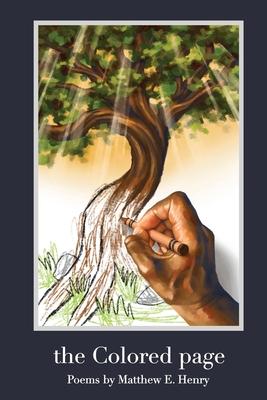This stunning new poetry collection by Matthew E. Henry (MEH), the Colored page, is a visceral meditation on the multi-layered experience of a Black body in educational spaces. Sprawling with metaphors and allusions to both the contemporary and the historic, Henry brings us an intense narrative chronicle of the speaker's life as student, educator, and finally as a writer. At the center there is a reckoning with the racism written into the pages of America, and Henry leads us from the microaggressions of educational oversight, to the horror of blatant dehumanization. In pieces that directly call out those responsible-educators, institutions, and peers alike-the speaker moves via Henry's generously vivid poems through open letters, vignettes, and poetic narratives that uncover the realities of an educator's life's work in the "United" States today. Here we see the impact of ferocious racism and its brutal cousin, weaponized incompetence. In a world that so often seeks to minimize Black experiences, the Colored page does not inflate, but neither does it look away. Yet, too, there is joy in these pages. Henry invites us to love, but please don't touch, the beauty of Black hair, of Black lives, and of our Black students. For as much as he shines that telling Black light on the stains of the institutions he has spent his life within, Henry here evidences a life well-lived, a life spent studying, growing, and thriving despite the biased budgeting and the crude mishandling of student dignity. Henry asks us to look at the vile and call it out, but then we are tasked to shift our focus to the glory that is the student who triumphs. Henry invites us, ultimately, to a celebration.

This stunning new poetry collection by Matthew E. Henry (MEH), the Colored page, is a visceral meditation on the multi-layered experience of a Black body in educational spaces. Sprawling with metaphors and allusions to both the contemporary and the historic, Henry brings us an intense narrative chronicle of the speaker's life as student, educator, and finally as a writer. At the center there is a reckoning with the racism written into the pages of America, and Henry leads us from the microaggressions of educational oversight, to the horror of blatant dehumanization. In pieces that directly call out those responsible-educators, institutions, and peers alike-the speaker moves via Henry's generously vivid poems through open letters, vignettes, and poetic narratives that uncover the realities of an educator's life's work in the "United" States today. Here we see the impact of ferocious racism and its brutal cousin, weaponized incompetence. In a world that so often seeks to minimize Black experiences, the Colored page does not inflate, but neither does it look away. Yet, too, there is joy in these pages. Henry invites us to love, but please don't touch, the beauty of Black hair, of Black lives, and of our Black students. For as much as he shines that telling Black light on the stains of the institutions he has spent his life within, Henry here evidences a life well-lived, a life spent studying, growing, and thriving despite the biased budgeting and the crude mishandling of student dignity. Henry asks us to look at the vile and call it out, but then we are tasked to shift our focus to the glory that is the student who triumphs. Henry invites us, ultimately, to a celebration.